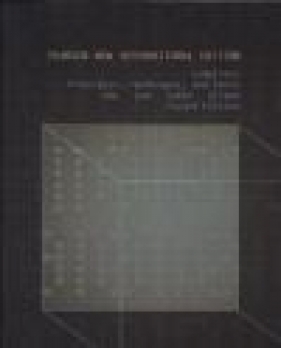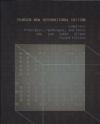Compilers
Jeffrey Ullman, R. Sethi, Monica Lam
Compilers
Jeffrey Ullman, R. Sethi, Monica Lam
- Producent: Pearson
- Rok produkcji: 2013
- ISBN: 9781292024349
- Ilość stron: 952
- Oprawa: Miękka
Niedostępna
Opis: Compilers - Jeffrey Ullman, R. Sethi, Monica Lam
Compilers: Principles, Techniques and Tools, known to professors, students, and developers worldwide as the "Dragon Book," is available in a new edition. Every chapter has been completely revised to reflect developments in software engineering, programming languages, and computer architecture that have occurred since 1986, when the last edition published. The authors, recognizing that few readers will ever go on to construct a compiler, retain their focus on the broader set of problems faced in software design and software development. New chapters include: Chapter 10 Instruction-Level Parallelism Chapter 11 Optimizing for Parallelism and Locality1 Introduction 1.1 Language Processors 1.2 The Structure of a Compiler 1.3 The Evolution of Programming Languages 1.4 The Science of Building a Compiler 1.5 Applications of Compiler Technology 1.6 Programming Language Basics 1.7 Summary of Chapter 1 1.8 References for Chapter 1 2 A Simple Syntax-Directed Translator 2.1 Introduction 2.2 Syntax Definition 2.3 Syntax-Directed Translation 2.4 Parsing 2.5 A Translator for Simple Expressions 2.6 Lexical Analysis 2.7 Symbol Tables 2.8 Intermediate Code Generation 2.9 Summary of Chapter 2 3 Lexical Analysis 3.1 The Role of the Lexical Analyzer 3.2 Input Buffering 3.3 Specification of Tokens 3.4 Recognition of Tokens 3.5 The Lexical-Analyzer Generator Lex 3.6 Finite Automata 3.7 From Regular Expressions to Automata 3.8 Design of a Lexical-Analyzer Generator 3.9 Optimization of DFA-Based Pattern Matchers 3.10 Summary of Chapter 3 3.11 References for Chapter 3 4 Syntax Analysis 4.1 Introduction 4.2 Context-Free Grammars 4.3 Writing a Grammar 4.4 Top-Down Parsing 4.5 Bottom-Up Parsing 4.6 Introduction to LR Parsing: Simple LR 4.7 More Powerful LR Parsers 4.8 Using Ambiguous Grammars 4.9 Parser Generators 4.10 Summary of Chapter 4 4.11 References for Chapter 4 5 Syntax-Directed Translation 5.1 Syntax-Directed Definitions 5.2 Evaluation Orders for SDD's 5.3 Applications of Syntax-Directed Translation 5.4 Syntax-Directed Translation Schemes 5.5 Implementing L-Attributed SDD's 5.6 Summary of Chapter 5 5.7 References for Chapter 5 6 Intermediate-Code Generation 6.1 Variants of Syntax Trees 6.2 Three-Address Code 6.3 Types and Declarations 6.4 Translation of Expressions 6.5 Type Checking 6.6 Control Flow 6.7 Backpatching 6.8 Switch-Statements 6.9 Intermediate Code for Procedures 6.10 Summary of Chapter 6 6.11 References for Chapter 6 7 Run-Time Environments 7.1 Storage Organization 7.2 Stack Allocation of Space 7.3 Access to Nonlocal Data on the Stack 7.4 Heap Management 7.5 Introduction to Garbage Collection 7.6 Introduction to Trace-Based Collection 7.7 Short-Pause Garbage Collection 7.8 Advanced Topics in Garbage Collection 7.9 Summary of Chapter 7 7.10 References for Chapter 7 8 Code Generation 8.1 Issues in the Design of a Code Generator 8.2 The Target Language 8.3 Addresses in the Target Code 8.4 Basic Blocks and Flow Graphs 8.5 Optimization of Basic Blocks 8.6 A Simple Code Generator 8.7 Peephole Optimization 8.8 Register Allocation and Assignment 8.9 Instruction Selection by Tree Rewriting 8.10 Optimal Code Generation for Expressions 8.11 Dynamic Programming Code-Generation 8.12 Summary of Chapter 8 8.13 References for Chapter 8 9 Machine-Independent Optimizations 9.1 The Principal Sources of Optimization 9.2 Introduction to Data-Flow Analysis 9.3 Foundations of Data-Flow Analysis 9.4 Constant Propagation 9.5 Partial-Redundancy Elimination 9.6 Loops in Flow Graphs 9.7 Region-Based Analysis 9.8 Symbolic Analysis 9.9 Summary of Chapter 9 9.10 References for Chapter 9 10 Instruction-Level Parallelism 10.1 Processor Architectures 10.2 Code-Scheduling Constraints 10.3 Basic-Block Scheduling 10.4 Global Code Scheduling 10.5 Software Pipelining 10.6 Summary of Chapter 10 10.7 References for Chapter 10 11 Optimizing for Parallelism and Locality 11.1 Basic Concepts 11.2 Matrix Multiply: An In-Depth Example 11.3 Iteration Spaces 11.4 Affine Array Indexes 11.5 Data Reuse 11.6 Array Data-Dependence Analysis 11.7 Finding Synchronization-Free Parallelism 11.8 Synchronization Between Parallel Loops 11.9 Pipelining 11.10 Locality Optimizations 11.11 Other Uses of Affine Transforms 11.12 Summary of Chapter 11 11.13 References for Chapter 11 A A Complete Front End A.1 The Source Language A.2 Main A.3 Lexical Analyzer A.4 Symbol Tables and Types A.5 Intermediate Code for Expressions A.6 Jumping Code for Boolean Expressions A.7 Intermediate Code for Statements A.8 Parser A.9 Creating the Front End B Finding Linearly Independent Solutions Index
Producent:
GPSR Pearson Central Europe Sp. z o.o.
ul. Szamocka 8
01-748 Warszawa (PL)
tel: 459 596 060
email: [email protected]
Szczegóły: Compilers - Jeffrey Ullman, R. Sethi, Monica Lam
Tytuł: Compilers
Autor: Jeffrey Ullman, R. Sethi, Monica Lam
Producent: Pearson
ISBN: 9781292024349
Rok produkcji: 2013
Ilość stron: 952
Oprawa: Miękka
Waga: 2.05 kg

































